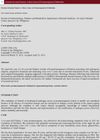 1 citations,
October 2008 in “Expert Review of Dermatology”
1 citations,
October 2008 in “Expert Review of Dermatology” Frontal Fibrosing Alopecia is a slowly progressing hair loss condition, likely underdiagnosed, with ineffective treatments, needing more research to understand it fully.
 June 2003 in “Obstetrical & Gynecological Survey”
June 2003 in “Obstetrical & Gynecological Survey” Postmenopausal ovary stromal cells have a unique makeup and limited steroid production, suggesting androgens come from the adrenal gland.
[object Object] December 2020 in “Research Square (Research Square)” Rare ovarian tumors can cause increased male hormones in postmenopausal women; surgery is an effective treatment.
 December 2020 in “Èffektivnaâ farmakoterapiâ”
December 2020 in “Èffektivnaâ farmakoterapiâ” Selenzin Peptide Active can effectively treat hair loss in postmenopausal women.
 June 1995 in “International Journal of Gynecology & Obstetrics”
June 1995 in “International Journal of Gynecology & Obstetrics” Higher doses of oestradiol implants improve bone density in postmenopausal women.
 January 2014 in “European Geriatric Medicine”
January 2014 in “European Geriatric Medicine” A postmenopausal woman's virilization was caused by a rare ovarian tumor that was hard to detect but was successfully treated with surgery.
 2 citations,
August 2011 in “Revista Medica De Chile”
2 citations,
August 2011 in “Revista Medica De Chile” A postmenopausal woman's high testosterone levels and symptoms improved after removing a tumor from her ovary.
 August 2009 in “International Journal of Dermatology”
August 2009 in “International Journal of Dermatology” A postmenopausal woman's facial redness, acne, and excess hair were caused by too much hormone therapy for insomnia, but improved after stopping the treatment.
 January 2013 in “Revista Clínica Española”
January 2013 in “Revista Clínica Española” A postmenopausal woman's increased male hormone levels were successfully treated with surgery.
22 citations,
April 2012 in “Informa Healthcare eBooks” Frontal fibrosing alopecia is a type of hair loss that usually happens after menopause.
 2 citations,
November 2017 in “Journal of Endocrinological Investigation”
2 citations,
November 2017 in “Journal of Endocrinological Investigation” The painting of an 18th-century Sicilian baroness shows she had hair loss, possibly due to ovarian issues, insulin resistance, or a specific type of tumor.
 1 citations,
January 2018 in “Medical Science and Discovery”
1 citations,
January 2018 in “Medical Science and Discovery” The document's conclusion cannot be provided as the content is not available for parsing.
 5 citations,
January 2017 in “Acta Endocrinologica”
5 citations,
January 2017 in “Acta Endocrinologica” High androgen levels in postmenopausal women may suggest an ovarian tumor, and removing it can improve heart and metabolic health.
 May 2013 in “Journal of the ASEAN Federation of Endocrine Societies”
May 2013 in “Journal of the ASEAN Federation of Endocrine Societies” Ovarian stromal tumors are a rare cause of women developing male characteristics after menopause.
 36 citations,
May 2011 in “The Journal of Clinical Endocrinology & Metabolism”
36 citations,
May 2011 in “The Journal of Clinical Endocrinology & Metabolism” Treatment with a hormone agonist can reduce excess male hormones in postmenopausal women without surgery.
 December 2021 in “Aegean journal of obstetrics and gynecology”
December 2021 in “Aegean journal of obstetrics and gynecology” A woman's male-like physical changes were caused by two rare ovarian conditions.
 155 citations,
September 2008 in “British journal of dermatology/British journal of dermatology, Supplement”
155 citations,
September 2008 in “British journal of dermatology/British journal of dermatology, Supplement” FFA is more common in postmenopausal women, can affect younger women, and may stabilize over time.
 17 citations,
May 2012 in “Clinical Endocrinology”
17 citations,
May 2012 in “Clinical Endocrinology” Surgery to lower high testosterone in postmenopausal women with certain ovarian tumors doesn't significantly affect their metabolism.
 7 citations,
April 2012 in “Clinical investigation”
7 citations,
April 2012 in “Clinical investigation” Transdermal testosterone can improve sexual desire in postmenopausal women but lacks long-term safety data and is not FDA-approved for this use.
 18 citations,
May 2014 in “Menopause”
18 citations,
May 2014 in “Menopause” A 5 mg dose of transdermal testosterone cream effectively restores testosterone levels in postmenopausal women.
April 2019 in “Journal of the Endocrine Society” A woman's severe insulin resistance improved with treatment, but she still had high testosterone levels due to ovarian issues.
 2 citations,
March 2004 in “Reviews in Gynaecological Practice”
2 citations,
March 2004 in “Reviews in Gynaecological Practice” Hormonal changes and psychological issues can cause sexual dysfunction in postmenopausal women. Behavioral therapy is recommended first, with hormone replacement helping some symptoms but not libido. Testosterone can improve libido, but its effects on overall sexual function are unclear. Emotional and relationship issues should be addressed before using medication, and the benefits and risks of testosterone supplementation should be considered.
 2 citations,
May 2018 in “Diagnosis”
2 citations,
May 2018 in “Diagnosis” A 68-year-old woman developed male traits due to a tumor in her ovary, which was removed, returning her hormone levels to normal.
[object Object] September 2019 in “Clinical research in practice” High-dose finasteride effectively treats hair loss in postmenopausal women.
4 citations,
April 2020 in “Dermatology practical & conceptual” Topical finasteride works faster and better than 17α-estradiol for postmenopausal hair loss.
22 citations,
January 2019 in “Climacteric” Oophorectomy lowers testosterone and estrogen levels in both premenopausal and postmenopausal women, with postmenopausal women still producing significant testosterone.
 11 citations,
September 2012 in “Journal of obstetrics and gynaecology Canada”
11 citations,
September 2012 in “Journal of obstetrics and gynaecology Canada” Testosterone therapy seems safe for short-term use in postmenopausal women with low sexual desire, but more research on long-term effects is needed.
 48 citations,
July 2009 in “The Journal of Sexual Medicine”
48 citations,
July 2009 in “The Journal of Sexual Medicine” DHEA did not improve sexual function, well-being, or menopausal symptoms in postmenopausal women with low libido but caused side effects like acne and increased facial hair.
 December 2013 in “Open Access Macedonian Journal of Medical Sciences”
December 2013 in “Open Access Macedonian Journal of Medical Sciences” A woman's excessive hair growth and high testosterone were caused by a rare ovarian tumor, which was successfully treated with surgery.
 August 2015 in “Dermatología Argentina”
August 2015 in “Dermatología Argentina” Frontal fibrosing alopecia causes hairline recession and eyebrow loss in postmenopausal women.
























